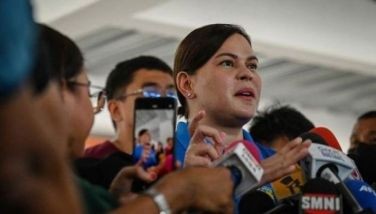Pharmacists join drive vs counterfeit medicines
September 18, 2005 | 12:00am
The Philippine Pharmaceutical Association (PPHA) and Watsons, a health and beauty retail company, have joined the Coalition Against Fake Medicines to help eradicate the P9.5-billion-a-year counterfeit drug industry in the country.
PPHA director Normita Leyesa said they want to help curb the spread of fake medicines because these products are hazardous to the health of those who consume them.
"We want to make sure that the medicines we are selling come only from legitimate sources... This is also one way of policing our ranks," she told The STAR.
Drug stores in the Philippines cannot operate without a duly licensed pharmacist, who not only dispense drugs prescribed by doctors, they often have to answer questions by patients asking for advice on the selection, dosage, interactions and side effects of medicines.
Leyesa said that as a member of the coalition, the members of PPHA working in drug stores will report the sale of fake medicines. She added that PPHA members working in the academe or in hospitals would help educate the public on the hazards of taking counterfeit drugs.
Currently, almost all types of drugs are being counterfeited — from cough syrups to life-saving antibiotics — so the public should be more cautious when buying medicines, the PPHA said.
Under the Special Law on Counterfeit Drugs of 1996 (Republic Act 8203), a jail term of up to 10 years or a fine of up to P100,000 await those proven to be involved in the manufacturing, sale, distribution, trafficking and brokering of counterfeit medicines.
Should these fake drugs cause death, the law imposes life imprisonment and a fine of up to P5 million.
The coalition is composed of the Department of Health, Department of Trade and Industry, Department of Justice, Philippine Medical Association, Drugstore Association of the Philippines, Mercury Drug Corp., Zuellig Pharma Corp., Pfizer Inc. and GMA-7 broadcast network.
The coalition encourages the public to report the information they have on counterfeit medicines by calling the toll-free number 1-800-10-FAKEMED from anywhere in the country.
PPHA director Normita Leyesa said they want to help curb the spread of fake medicines because these products are hazardous to the health of those who consume them.
"We want to make sure that the medicines we are selling come only from legitimate sources... This is also one way of policing our ranks," she told The STAR.
Drug stores in the Philippines cannot operate without a duly licensed pharmacist, who not only dispense drugs prescribed by doctors, they often have to answer questions by patients asking for advice on the selection, dosage, interactions and side effects of medicines.
Leyesa said that as a member of the coalition, the members of PPHA working in drug stores will report the sale of fake medicines. She added that PPHA members working in the academe or in hospitals would help educate the public on the hazards of taking counterfeit drugs.
Currently, almost all types of drugs are being counterfeited — from cough syrups to life-saving antibiotics — so the public should be more cautious when buying medicines, the PPHA said.
Under the Special Law on Counterfeit Drugs of 1996 (Republic Act 8203), a jail term of up to 10 years or a fine of up to P100,000 await those proven to be involved in the manufacturing, sale, distribution, trafficking and brokering of counterfeit medicines.
Should these fake drugs cause death, the law imposes life imprisonment and a fine of up to P5 million.
The coalition is composed of the Department of Health, Department of Trade and Industry, Department of Justice, Philippine Medical Association, Drugstore Association of the Philippines, Mercury Drug Corp., Zuellig Pharma Corp., Pfizer Inc. and GMA-7 broadcast network.
The coalition encourages the public to report the information they have on counterfeit medicines by calling the toll-free number 1-800-10-FAKEMED from anywhere in the country.
BrandSpace Articles
<
>
- Latest
- Trending
Trending
Latest






























